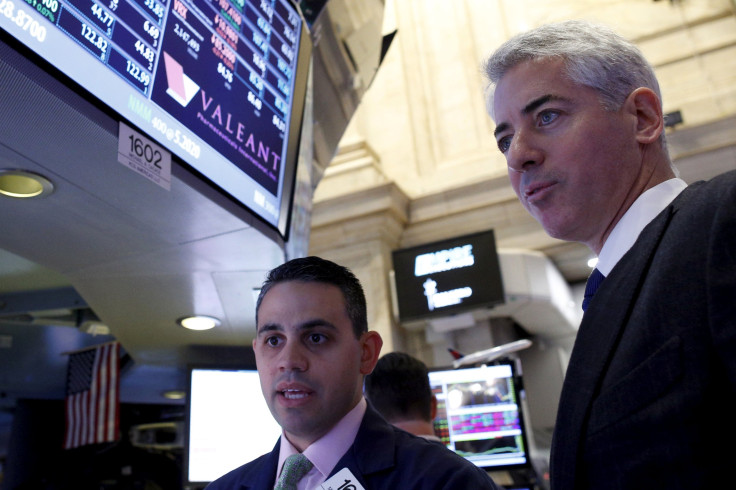Betting Against Hedge Fund Favorites Could Be The Smartest Investing Strategy For Early 2016

Last May, hedge fund billionaire Bill Ackman called Valeant Pharmaceuticals “a very early-stage Berkshire Hathaway,” suggesting that the deal-happy pharmaceutical company could rival Warren Buffett’s unrivaled performance.
That was then. Since that prediction nine months ago, Valeant’s stock price has fallen more than 60 percent as a series of stumbles and scandals has wracked the Canadian drugmaker. Ackman doubled down on his Valeant bet during a turbulent October, only to see the stock decline another 25 percent. He wasn’t alone: Last summer Goldman Sachs estimated that more than one-fifth of Valeant’s outstanding shares were owned by hedge funds.
The billions lost on Valeant, which suffered renewed falls this week, exemplify how some of the darling stocks in the hedge fund world have fallen far short of expectations over the past six months. Ordinarily considered the “smart money” in the markets, hedge fund holdings have drooped as stocks generally rejected by fund managers have shone.
In short, an equity investor who picked the very stocks that hedge funds have shunned since October would have beaten the markets, particularly during the topsy-turvy months of January and early February. That’s one takeaway from a recent note to clients from Goldman Sachs analysts led by David Kostin, the bank’s chief U.S. equity strategist.
“The momentum reversal in January hurt heavily concentrated hedge fund portfolios,” Goldman wrote, noting that subsequent moves out of big bets created “a vicious cycle that compounded the underperformance of the most popular hedge fund positions.”
A Goldman Sachs index of stocks generally eschewed by hedge funds posted its strongest six-month returns since 2008, outperforming the bank’s index of hedge fund darlings by more than 10 percent in the past year. The so-called Very Important Performers list fell 10 percent year-to-date, trailing the S&P 500, which was down 6 percent.
The decline was due in large part to hedge funds’ growing affection for the so-called FANG stocks: Facebook, Amazon, Netflix and Google. “Funds have become especially dependent on the performance of a few key stocks,” Goldman wrote, noting that fund managers more than doubled their holdings in these companies over the course of 2015.
Though shares in these companies soared in 2015, they took a beating in the first six weeks of 2016, with Facebook alone edging out the broader S&P 500.
The underperformance of hedge funds’ favorite stocks, however, doesn’t mean the entire hedge fund world has suffered. Many hedge funds focus on particular corners of the market, such as commodities and debt well outside of the stock space. And many of those that do bet on stocks use a combination of other tools, including derivatives and shorts, to hedge their positions.
In the aggregate, hedge funds have just edged out the broader S&P 500 year-to-date, Goldman Sachs said.
But according to portfolio manager Mark Yusko of Morgan Creek Capital Management, performance varied widely for different types of hedge funds. “Some very high-profile hedge fund managers had terrible years,” Yusko wrote in a letter to clients Monday. “A very important point is that it wasn’t the hedged funds that struggled in 2015, but rather the long-only activist managers.”
In other words, traditional funds that literally hedge their positions with shorts and other methods — as the term “hedge fund” originally denoted — have not fallen as much as so-called activist hedge funds, like Ackman’s Pershing Square Capital, have. Those funds take outsize stock positions in companies, and then lobby those companies for changes that benefit their stock positions.
“The true pain in hedge fund land,” Yusko wrote, “was felt by the activist funds as many of the large brand-name funds fell another 5 percent to 10 percent.” In January, activist funds fell by an asset-weighted 4.3 percent, according to research group HFR. Equity hedge funds fell 3.5 percent, while macro funds — which invest in an even wider universe of assets, including currencies and global debt — rose 1.7 percent.
After rising 35 percent in 2014, Ackman’s Pershing Square fell 21 percent in 2015, and another 19 percent in the first six weeks of this year. In total, it was the worst start of a year for hedge funds since 2008. Omega Advisors, the fund of billionaire Leon Cooperman, sagged 10 percent last year and continued to struggle in 2016.
“The 2015 fourth quarter capped off a difficult year for equity and credit markets globally, and 2016 has gotten off to a challenging start,” Dan Och, manager of the publicly traded hedge fund Och-Ziff, said earlier this month. Shares in Och-Ziff fell 60 percent last year.
“However, this type of environment plays to our strengths and we are well positioned to manage such uncertainty,” Och continued. “Dynamic capital allocation has always been a cornerstone of much of our business, and it will be critical in this environment.”
© Copyright IBTimes 2025. All rights reserved.






















